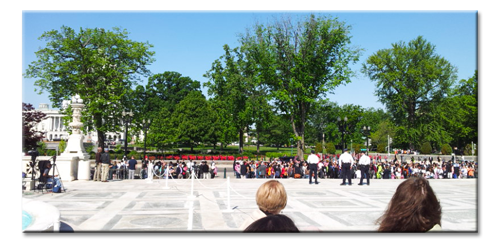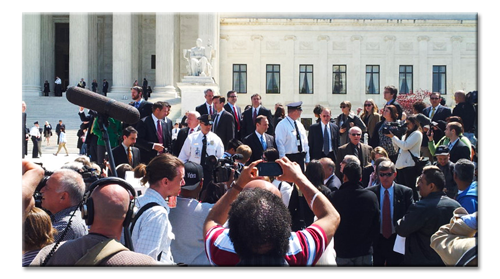Today the Supreme Court heard Arizona v. United States, the case involving Arizona’s S.B. 1070, also known as the "Support Our Law Enforcement and Safe Neighborhoods Act." I was able to watch part of the argument and take the photos and video below. Though the decision will not come out until summer, the Court's questioning has many concluding that the Court is more likely than not to side with Arizona on at least some, if not all of the issues. Here's a sampling of the latest headlines:
CNN: “High court appears to lean toward Arizona in immigration law dispute”
FoxNews: “Supreme Court signals support for Arizona immigration law provision”
Huffington Post: “Supreme Court Appears To Favor Arizona On Controversial Immigration Law.”
Two things stood out from the portion of the oral argument I witnessed. First, Justice Scalia seemed very protective of Arizona’s right to protect its citizens from illegal activity. He noted that "Arizona is not trying to kick out anybody that the federal government has not already said do not belong here" and that the Constitution "recognizes that there is such a thing as state borders and the states can police their borders."
Chief Justice Roberts punched holes in the Obama administration’s preemption argument, questioning whether it is appropriate to preempt a state law based on the political leanings of the White House, rather than on congressional intent. He asked: “let's say that the government had a different set of enforcement priorities, and their objective was to protect to the maximum extent possible the borders; and, so anyone who is here illegally, they want to know about and they want to do something about, in other words, different than the current policy. Does that mean in that situation the Arizona law would not be preemptive?” Roberts seems to have been suggesting that a state law should only be preempted if it directly conflicts with congressional intent because Executive Branch “priorities” are constantly shifting and are therefore cannot serve the foundation of a preemption argument.
I wrote a short analysis of the political issues for U.S. News & World Report, which you can read (and vote for!) here. Simply put, the Obama administration believes its political decision to not enforce immigration laws should preempt any state effort to pass laws that complement existing federal immigration laws. But selective enforcement by the Executive Branch should not justify the law being preempted; the Supreme Court has held that it is Congress’s “clear and manifest purpose” that should be controlling when preemption issues arise.
Outside the Supreme Court, large groups of supporters and opponents of S.B. 1070 gathered to voice their concerns. Activists from La Raza, SEIU, Casa de Maryland, ANSWER, and even a few Occupy folks yelled loudly. Even illegal alien journalist Jose Antonio Vargas made his way to protest, himself a clear symbol of the federal government’s refusal to enforce our immigration laws. The pro-enforcement crowd gave a small, but valiant showing.
Kansas Secretary of State Kris Kobach, who helped draft S.B. 1070, was optimistic about the law’s fate, telling Fox News: “This was a very good day for Arizona in the Supreme Court… The U.S. Justice Department was on the ropes.” In the video I shot below, Kobach explains that the Obama administration’s decision to not enforce immigration law should not justify preemption:
“Never before has that refusal to enforce federal law resulted in preempting the states from enforcing their own laws that mirror federal law. And I think that is the fundamental problem of the Justice Department’s case. The Court recognized that problem, harped on that problem again and again, and the Justice Department had no answer.”
The transcript of today's argument is here.
An audio recording of the Court’s proceedings is also now available.


